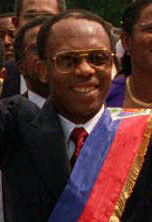Top 33 Quotes & Sayings by Jean-Bertrand Aristide
Explore popular quotes and sayings by a Haitian statesman Jean-Bertrand Aristide.
Last updated on April 14, 2025.
Sometimes people who want to understand Haiti from a political perspective may be missing part of the picture. They also need to look at Haiti from a psychological perspective. Most of the elite suffer from psychogenic amnesia. That means it's not organic amnesia, such as damage caused by brain injury. It's just a matter of psychology.
The spirit of Ubuntu, that once led Haiti to emerge as the first independent black nation in 1804, helped Venezuela, Colombia and Ecuador attain liberty, and inspired our forefathers to shed their blood for the United States' independence, cannot die. Today, this spirit of solidarity must and will empower all of us to rebuild Haiti.
Love is the air that I breathe, like oxygen. When I lack it, I feel atrophied, asphyxiated. When I have it, I feel I am growing. And so this growth is linked to others, or to a collective other. If I realize that I do not love you, my faith diminishes, and I breathe less and less of the oxygen of life. When I feel linked to you, in communion with you, there is a current of love that passes between us, and the intensity can multiply. And the more this love grows, the more the faith becomes luminous, the more I feel linked to the collective other. I am speaking of God.




























